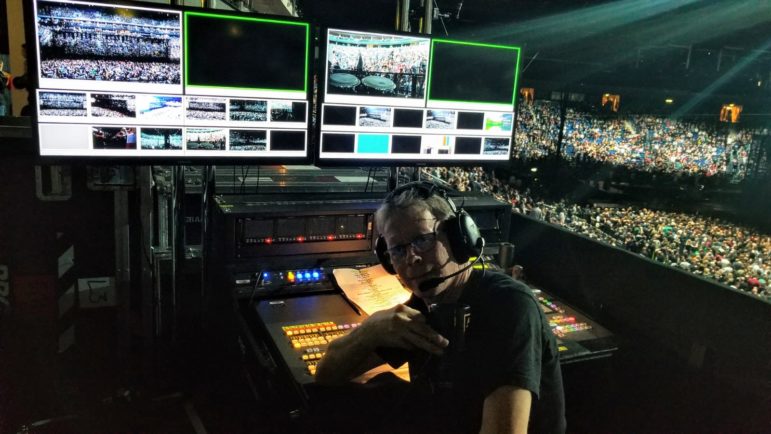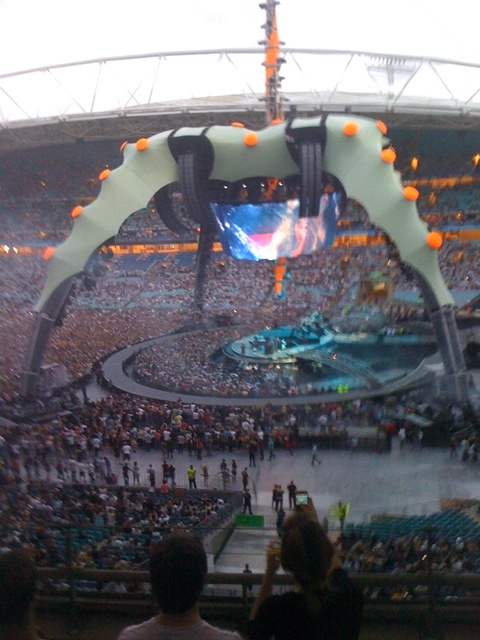ASHEVILLE, N.C. – The absence of events that involve large groups of people since the COVID-19 pandemic began has been witnessed by everyone worldwide. But the depth of that effect on the music industry has driven parts of it to the verge of collapse.

A venue during load-in, 2012 – Image credit: J. Strasser
The music industry has crumbled well beyond just affecting musicians. Big-name artists have a variety of tools at their disposal to stay connected to their fans, and the revenue and resources to wait out the lull in performances.
Lesser-known or niche bands and artists like this in the Pagan community, however, do not have those extended financial resources despite access to tools helping them stay connected with their fans.
Danny Mullikin, leader of the band Tuatha Dea, knows firsthand how difficult the current situation is for performers. Once the pandemic took hold and all live events were canceled, Mullikin began exploring options for “staying relevant” as he put it, and also how to generate some income for the band.
Live-streaming performances was one option, but to do so on a professional level required many more resources than just Facebook Live and a smartphone.
Mullikin spent some time researching live-streaming services to identify the best option for them, including additional equipment. It took time, and once he and his band decided on a service they were greeted with another learning curve: how to use the new equipment and the streaming application.
Mullikin and Tuatha Dea were fortunate enough to have good local support. The Rampant Lion pub owner offered them the use of one of his establishments, while it was closed.
The band began streaming a live show every Sunday night and encouraged people to tip, via PayPal, Venmo, and other apps. Eventually, the band opted to create a Patreon account. They moved the majority of their live-streamed shows over to that platform but still continued to offer some live content for free on Facebook & YouTube.
“While the support from fans has continued there is a big disparity between the number of people who tune in to watch live events and the amount of money that gets contributed. Everything is just so uncertain and insubstantial. I don’t know what any of us are going to do,” Mullikin said.
A few months ago as the pandemic seemed deceptively waning, many places began to lift restrictions and the owners of the Rampant Lion resumed most of their regular hours of operation. By then Mullikin and Tuatha Dea had already begun to utilize other locations and participated in both shows from remote locations, and traveled to perform in venues that remained closed or offered limited seating but broadcasted performances, like The White Horse in Black Mountain, North Carolina and the Hard Rock Café in Pigeon Forge, Tennessee.
Outsiders to the music industry often think of it as big record labels, artists who have major name recognition, and the retail and media outlets. But the industry itself is made up of far more than just account executives and artists. Even at the A-List level of performing, just one big concert requires hundreds of support personnel which include the artist’s touring crew, which can easily number over 75 people on any major tour.
Jay Strasser, a videographer who has worked on tours with artists like Cher, Prince, U2, and countless other A-list artists has personally felt the pinch. Strasser has worked in the music business for over 35 years and has zero prospects for any employment within the industry for the foreseeable future. No tours are planned or scheduled and no one has any idea when they will be.

Jay Strasser directing U2 in Berlin, Germany, 2018 – Image credit Joel Merrill
Touring personnel like Strasser typically work anywhere from 40-50 weeks out of the year, and frequently travel all over the world, being away from home and on the road for months at a time. The majority of technical support professionals like Strasser expect and plan for downtime each year. However, the prospect of no work for possibly another year is beyond anything those who work in the industry have ever seen.
Strasser said, “You can make decent money touring, but the downside is that you can occasionally have periods where every tour going out is already staffed due to the way tours are scheduled sometimes. Most of us that work on tours plan ahead for those times and have a rainy day fund to get by.”
He went on to say, “But this, I don’t think anyone could plan for something like this, the entire industry being shut down with no real end in sight.”
Strasser has been collecting unemployment, but those benefits are soon to expire. As for future endeavors and what he will do when benefits completely run out he said, “I will try to fall back on the talents I have—woodworking, framing, maybe selling off accumulated tour merchandise online, and possibly videoing workshops or other events that can be streamed.”
Local stagehands that help with everything from loading in and out equipment from trucks, set the rigging, provide support during the show—cable pages, support for lighting & video crews, and security just to name a few. Then there is the army of local people who do everything to set up and tear down the chairs on the floor, function as ushers, staff all the food and beverage stations, perpetually clean walkways & maintain bathrooms, and sell tickets.
Each venue employs hundreds of people, the majority of which few people see, who work behind the scenes to make sure the camera positions and access points are right and do not restrict fire exit access or unduly block the views of attendees. But the impact does not even end there. Local restaurants, shops, hotels, and even parking garages all see a surge in business for big concerts.
Concert tours that overnight must also supply hotel rooms for their crew members, bus and truck drivers, parking for buses, and sometimes trucks. And all the touring crew personnel will visit restaurants, bars, and other businesses if they have a day off. Even with no day off or hotel stay, caterers contracted to the venue provide food—three meals a day. Florists frequently see a boost to business, both those contracted to the venue and other florists can be impacted by an influx of orders.
While all of these people have been impacted by the loss of big shows, smaller venues, many unable to open at all due to restrictions, are in peril of possibly never reopening. Overnight millions of people globally lost their jobs and even more that benefit in one way or another from live music events lost critical income.

U2 360 Tour 2010 in Sydney, Australia, – Image credit: J. Strasser
Large production companies that provide video, lighting, and sound, as well as staffing for major concert tours and corporate programming, have begun permanently furloughing some of their staff.
Tom Z, who identifies as a Buddhist, and worked as a labor manager for a major equipment and staffing supplier for the music industry was notified last month that he no longer was employed. He has worked in the industry since he was 17 and never really done anything else, and is unsure what will be next.
“Our job is to be invisible. Every time you go to a concert, a convention, or a sporting event, you know nothing about the people who do everything from directing you to a parking spot, take your ticket, sell you a bucket of popcorn, and help you find your seat. Then when the lights come down… there are a whole ton of people who make that happen to provide a shared experience,” Tom Z explained.
He also expressed dismay and disappointment for the lack of support for industry workers and professional touring crew members. “No one seems to know we exist. How many benefit concerts have you seen for roadies?”
As for the future, Tom Z said, “If things work out the way the people in New York on Broadway think, and are forecasting for Broadway shows to reopen in September 2021, will there be enough people to stage those shows? For a lot of actors and musicians, waiting tables and working in the restaurant business is their fallback position, but they don’t even have that right now. All of the stagehands and support personnel have no choice but to find jobs outside of the industry. Will the people who end up finding jobs in other industries be willing to give them up to return to the industry?”
When it comes to his personal future, Tom Z is on the cusp of turning 65. He says he could just retire, but has yet to decide. Like many of the thousands of people who work in the touring end of the industry, he will eventually be faced with making a choice of how he wants to move forward.
The Wild Hunt is not responsible for links to external content.
To join a conversation on this post:
Visit our The Wild Hunt subreddit! Point your favorite browser to https://www.reddit.com/r/The_Wild_Hunt_News/, then click “JOIN”. Make sure to click the bell, too, to be notified of new articles posted to our subreddit.